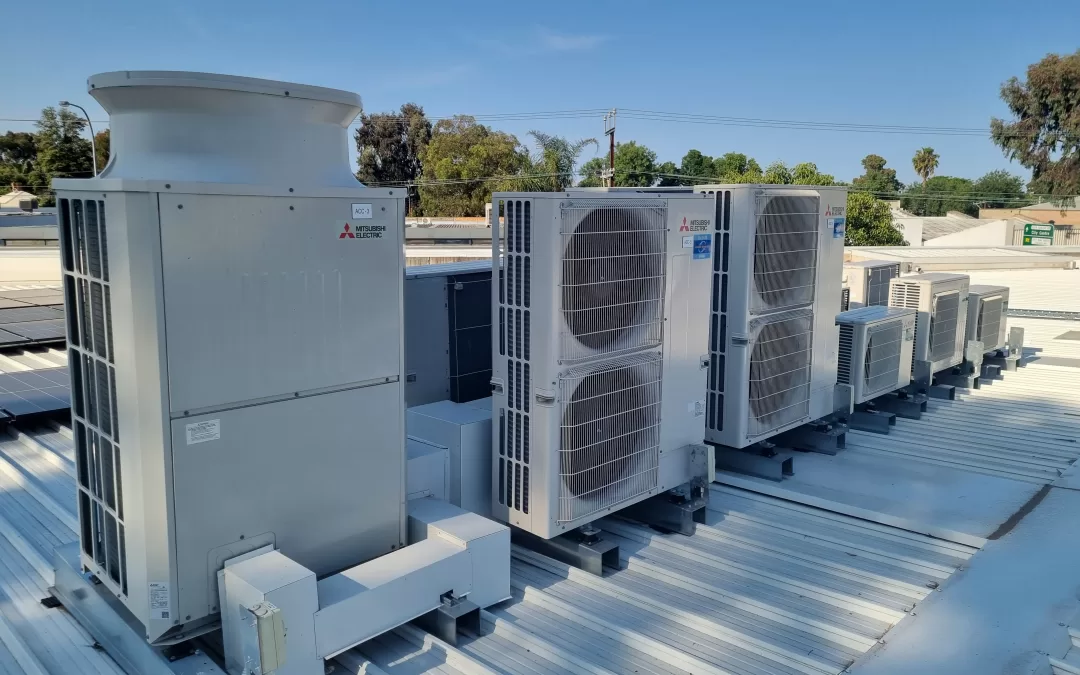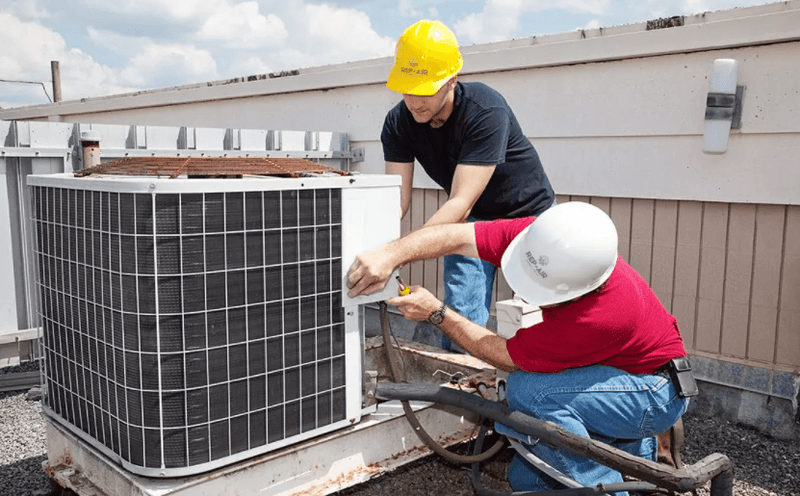Exploring the Necessary Parts of a Reliable A/c System
A reliable cooling and heating system is constructed on several vital elements that operate in harmony. Each component, from the thermostat to the ductwork, plays an essential duty in maintaining comfort and energy performance. Recognizing these aspects is essential for enhancing efficiency and improving indoor air quality. As one checks out these parts, the elaborate relationships in between them expose insights right into enhancing overall system efficiency. What certain aspects contribute most to this efficiency?
The Function of the Thermostat in Cooling And Heating Efficiency

Although usually overlooked, the thermostat plays a crucial role in the effectiveness of heating and cooling systems. HVAC experts. This small device works as the main control center, managing temperature level setups and ensuring perfect convenience within a room. By accurately picking up the ambient temperature, the thermostat connects with the air flow, home heating, and air conditioning systems to keep the wanted climate
An efficient thermostat minimizes energy intake by activating the HVAC system just when needed, thus avoiding extreme heating or air conditioning. Modern programmable and clever thermostats boost this efficiency better by enabling customers to set timetables and from another location adjust settings, adjusting to day-to-day regimens.
Additionally, the placement of the thermostat is essential; inappropriate place can bring about unreliable temperature analyses, leading to ineffective procedure. Generally, a well-functioning thermostat not only improves convenience yet additionally contributes substantially to energy savings and the durability of the a/c system.
Comprehending the Significance of Air Filters
Air filters offer a necessary feature in heating and cooling systems by ensuring that the air distributing within a space continues to be clean and healthy. These filters trap dust, allergens, and other pollutants, stopping them from being recirculated throughout the environment. By recording these fragments, air filters add to improved indoor air top quality, which can greatly profit passengers' health and wellness, particularly those with allergies or breathing conditions.
In addition, preserving tidy air filters enhances the efficiency of cooling and heating systems. Clogged filters can restrict air flow, triggering the system to work tougher to keep wanted temperatures, bring about raised power consumption and higher energy costs. Frequently changing or cleansing filters is a vital upkeep action that can extend the life expectancy of HVAC devices. Ultimately, comprehending the significance of air filters permits house owners and structure managers to take proactive measures to assure a well-functioning, effective heating and cooling system that advertises a secure and comfy interior setting.

The Functionality of the Furnace and Heatpump
Heating systems and heatpump are critical elements of HVAC systems, accountable for supplying warmth during cooler months. Heating systems operate by heating air through burning or electric resistance, then distributing it throughout the home via air ducts. They commonly provide fast home heating and can be fueled by natural gas, power, or oil, depending upon the system kind.
Conversely, heat pumps transfer warmth rather than produce it. They draw out heat from the outside air or ground, also in low temperature levels, and transfer it inside. HVAC experts. This double performance enables warmth pumps to also supply air conditioning in warmer months, making them functional choices for year-round climate control
Both systems require proper upkeep to ensure effectiveness and durability. While heating systems master severe cool, heat pumps can be advantageous in moderate climates. Understanding their unique functionalities aids homeowners in picking the most ideal alternative for their heating needs.
Exploring the Cooling Unit
The a/c device is an important element of a/c systems, readily available in numerous kinds to match different requirements. Understanding the efficiency scores of these systems is important for making informed selections about energy consumption and price. This area will certainly explore the varied kinds of air conditioning system and clear up just how performance rankings influence efficiency.
Types of Air Conditioners
While numerous aspects influence the option of cooling systems, recognizing the various types offered is essential for property owners and structure managers alike. Central air conditioners are made to cool whole homes or structures, using a network of air ducts for airflow. Home window units provide an even more local solution, ideal for solitary areas or tiny rooms. Portable air conditioning system give adaptability, enabling users to move the system as required. Ductless mini-split systems are another choice, integrating the effectiveness of central systems with the benefit of zoning, as they require no ductwork. Finally, geothermal systems harness the earth's temperature for energy-efficient air conditioning. Each type features distinctive benefits, making informed choices necessary for effective climate control.

Efficiency Ratings Described
Comprehending effectiveness rankings is crucial for picking the appropriate cooling system, as these metrics offer insight right into the system's efficiency and power usage. The most typical rating for ac system is the Seasonal Power Performance Proportion (SEER), which measures the cooling outcome throughout a common air conditioning period split by the complete electric power input. A greater SEER indicates better performance. Additionally, the Power Performance Proportion (EER) is utilized for measuring effectiveness under certain conditions. An additional essential metric is the Power Celebrity qualification, which indicates that a system meets rigorous power performance guidelines. By assessing these scores, customers can make educated choices that not just optimize convenience however likewise lower energy costs and environmental impact.
The Value of Ductwork and Air flow
Reliable ductwork design and air movement monitoring play important functions in the general effectiveness and efficiency of cooling and heating systems. Proper ductwork guarantees that conditioned air is dispersed evenly throughout a space, minimizing temperature level variations and enhancing convenience. Well-designed air ducts reduce resistance to air movement, lowering the work on cooling and heating tools and ultimately reducing power consumption.
Airflow management includes tactically placing vents and signs up to improve the circulation of air. This stops typical issues such as cool or warm spots, which can occur when air flow is blocked or inadequately well balanced. In addition, the ideal air duct products and insulation can further boost effectiveness by minimizing warmth loss or gain during air transportation.
An efficient ductwork system not just adds to energy financial savings however can also prolong the life expectancy of HVAC devices by minimizing unneeded pressure (HVAC experts). As a result, understanding the relevance of ductwork and air flow is vital for achieving peak heating and cooling system performance
Routine Upkeep Practices to Boost Performance
Regular upkeep practices are vital for ensuring peak efficiency of HVAC systems. These practices include regular assessments, cleaning, and essential repair services to maintain the system running successfully. Regularly changing air filters is crucial, as stopped up filters can block airflow and minimize efficiency. Additionally, service technicians ought to examine and tidy evaporator and condenser coils to stop getting too hot and energy waste.
Annual specialist inspections are likewise advised, as skilled technicians can recognize possible problems before they escalate. Lubing relocating parts lessens wear and tear, adding to a much longer life expectancy for the system. Making sure that the thermostat functions correctly aids in maintaining suitable temperature level control.
Frequently Asked Questions
How Frequently Should I Replace My Thermostat?
Thermostats need to normally be changed every 5 to one decade, depending upon use and innovation innovations. Routine checks are a good idea to ensure peak performance, especially if experiencing inconsistent temperature level control or raised power expenses.
What Size Air Filter Is Finest for My Cooling And Heating System?
The most effective dimension air filter for an a/c system differs by system design. Generally, it's important to seek advice from the proprietor's handbook or examine the existing filter dimensions to ensure peak efficiency and air quality.
Can I Set Up a Heatpump Myself?
Mounting a heat pump independently is possible for knowledgeable individuals, but it requires expertise of electrical systems and local codes. Employing an expert is advised to ensure appropriate setup and excellent system efficiency.
Just how Do I Know if My Ductwork Is Efficient?
To identify ductwork efficiency, one ought to look for leakages, step air movement at vents, inspect insulation quality, and review temperature differences in between supply and return air ducts. Specialist assessments can provide detailed insights right into general performance.
What Are Indications My Cooling And Heating Needs Immediate Upkeep?
Signs that a cooling and heating system needs immediate upkeep include unusual sounds, inconsistent temperature levels, increased energy bills, undesirable odors, and constant biking. Attending to these concerns immediately can stop additional damage and warranty height system efficiency.
Air filters offer an important function in HVAC systems by guaranteeing that the air distributing within an area remains clean and healthy. Furthermore, keeping tidy air filters boosts more info the effectiveness of A/c systems. Ductless mini-split systems are one more choice, incorporating the performance of main systems with the convenience of zoning, as they need no ductwork. Recognizing performance ratings is necessary for choosing the appropriate air conditioning device, as these metrics supply insight right into the system's efficiency and power consumption. The best dimension air filter for a Heating and cooling system differs by system style.